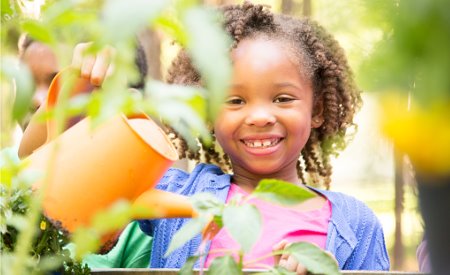
Careful Fasting – Food for Thought
This week, our Careful Lent topic of fasting will be a springboard to a reflection on food. Catholics fast on two days in Lent, Ash Wednesday and Good Friday. Lent begins and ends thinking about eating! Sometimes when we reduce or moderate something we enjoy, it helps us clarify its real value.
Food is essential for life and health. Meals create community, inviting conversation, and bringing us together. The appearance, aroma, and taste of food are delightful. God saw that His creation was “very good.” (Genesis 1:31)
In the creation story found in the second chapter of Genesis, the Creator planted a garden and gave humankind the responsibility to cultivate and care for the garden (Genesis 2:8,15).
At the heart of eating, we discover God’s constant care for us. His design grows the food, and our responsibility is to be caretakers of the garden. We collaborate in this ongoing, ever-renewing creation that sustains human and animal life.

Even if we are not directly involved in farming or the production of food, we are still caretakers. We care about the garden itself, God’s earth; we also are in solidarity with all the people involved in agricultural production. Human labor plows, plants, weeds, harvests, packages, ships, distributes, prepares, and serves food. We also care that our sisters and brothers around the world have access to nutritious food so they can thrive.
There are places in the Gospel where we find Jesus in the company of people at table. We can imagine that the meal setting was where He realized the community of God’s people, teaching and challenging His listeners. Often in His parables, He used images of farming and eating, for example, a lost sheep, a wedding banquet, a field of grain, a vineyard, seed in good soil, a lost son’s welcome home feast.

In our families, the table is the place where children learn about the importance of food for their growth and health. They also develop an understanding that eating is a social event, an occasion that symbolizes and grows our community. When we gather at the table, we try to teach children to share, to serve, and to help with cleanup. Depending on the ages of the participants, mealtime can be an adventure! Yet, we trust God’s Spirit is blessing our efforts. The family table is the space where we learn that God is present, nourishing us with food and community.
A few thoughts and suggestions:
- Prayer before and after meals can be brief, spontaneous, and shared by different family members.
- Food preparation can involve the whole family.
- A kitchen garden can introduce younger children to the mystery of life and growth.
- Donations of food to a local food pantry can lay a foundation for further learning about justice, human rights, and hunger in the world.
- Some farms offer tours and educational programs.
- A community garden builds community and provides the opportunity to volunteer.
- A meditative prayer could include reading any of the following, pausing between phrases, inviting God’s Spirit to expand our vision: The Our Father; The Magnificat (Luke 1:46-55); Psalm 23.
For more information on Catholic Social Teaching and global justice and farming.
About John Dacey
John Dacey is a retired Catholic high school teacher. He has taught Scripture, Ethics, and Social Justice. He enjoys being in the company of family, reading in the field of spirituality, and gardening. John and his wife have been married for more than 40 years and have two children and four grandchildren.

